Did you miss a recent Agilent pharma/biopharma workflow webinar? No worries. The best Agilent webinars are now available on demand. So, you can learn about everything from the entire range of workflow solutions.
To access the information-packed programs that interest you, simply click the links that follow.
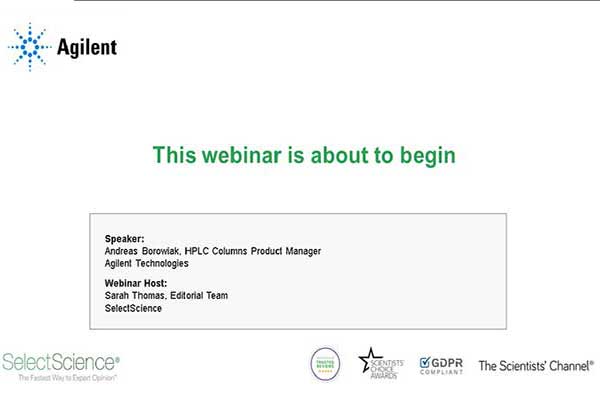
If you are looking to refresh your HPLC skills, gain practical knowledge on
longer lasting LC columns, or if you simply need some
troubleshooting advice,
register for our on-demand webinar. Hosted by SelectScience, and presented
by
our HPLC columns product manager, this webinar aims to help you to improve
your
HPLC skills.
Read more
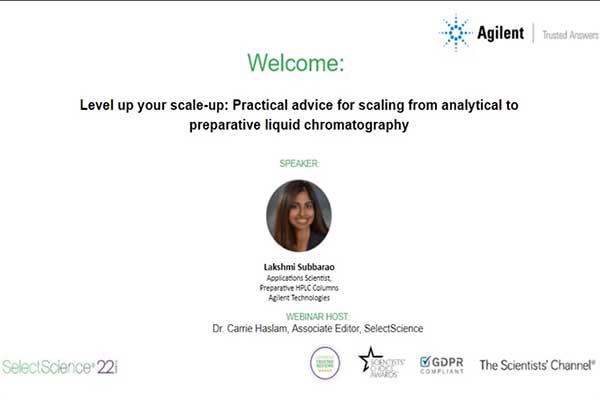
The adoption of preparative LC into a workflow, with larger columns and
instrumentation, can appear to be a daunting task. However, by following some
fundamental guidelines and a little practical advice, it can be quite
simple.
Through this webinar, we will outline the purification process and the steps
for
a successful purification. We will also discuss the considerations when
establishing a purification laboratory, and how to identify and avoid common
pitfalls during purification.
Read more
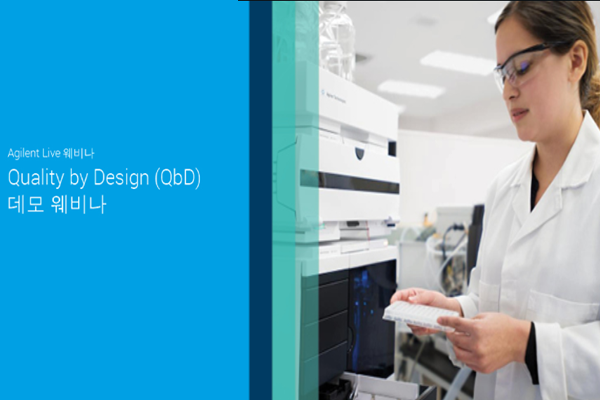
Align with the ICH Q8(R2) guidelines with the Agilent Method Development
System. We will introduce you to the quality by design (QbD)-based method
development approach.
In addition, to make method development accessible to everyone, you can
quickly
scout your method and see the results with a simple
setup.
Read more
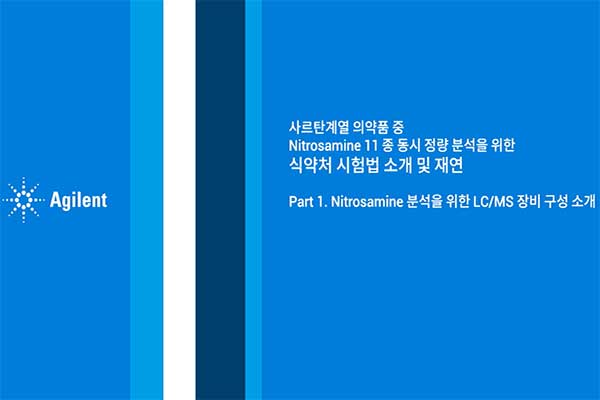
Explore the live demo series for NDMA analysis with Agilent GC/MS systems.
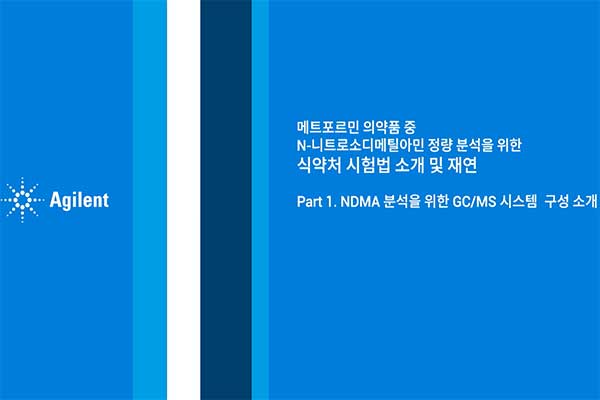
Explore the live demo series for NDMA Analysis with Agilent GCMS Systems
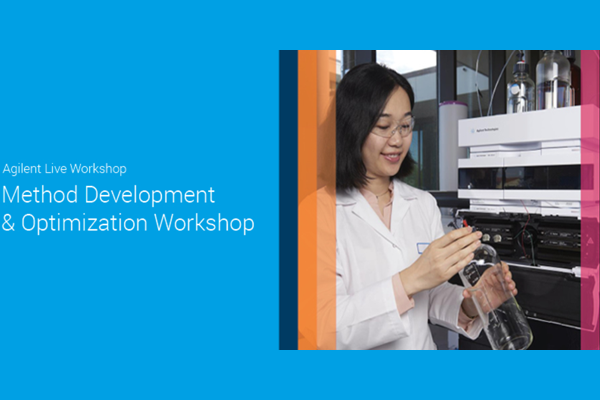
In this webinar we talk about the common challenges faced by HPLC users and
focus on method development solutions with maximum efficiency to optimize your
workflows. Agilent OpenLab CDS Software demonstration
will highlight some
automated method development features. Tips and tricks in using our Agilent
chemistries and supplies complement the application of these method
development
features.
Read more
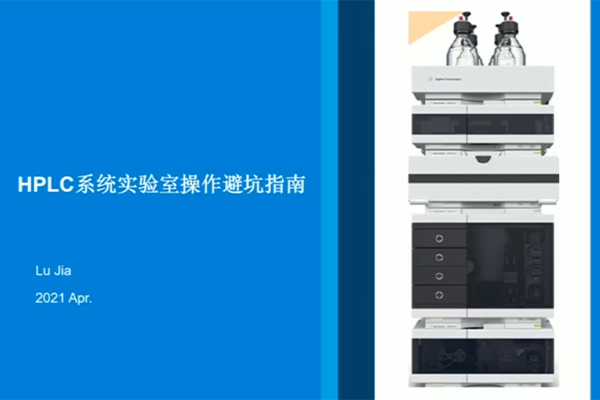
Guide to Pit Avoidance for Laboratory Operation of HPLC Systems. In this webinar we cover the most common issues faced in labs using LC systems looking into: method development, in-depth analysis of data collected, and reporting.
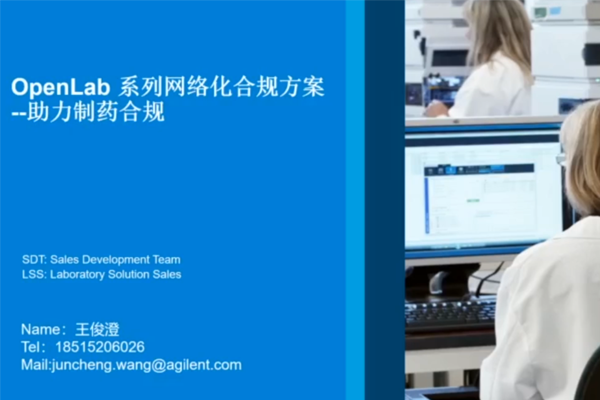
OpenLab Series Networked Compliance Solutions—Helping Pharmaceutical Compliance. In this webinar we discuss networking, regulation, data security, data integrity, and audit traceability helping you manage your compliance requirements.
The complete Agilent portfolio optimizes your workflow from sample preparation to analysis.
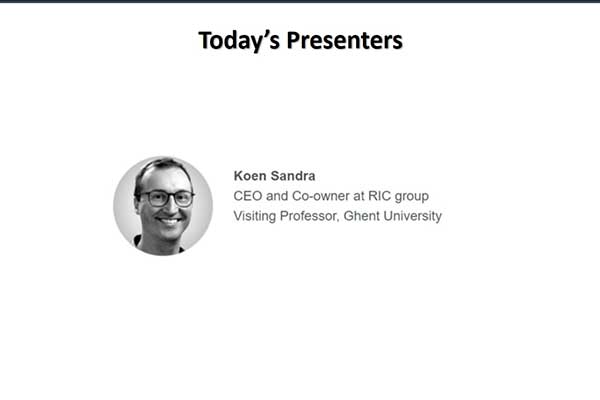
An emerging tool to tackle protein biopharmaceuticals like monoclonal antibodies
(mAbs), antibody drug conjugates (ADCs), fusion proteins,
hormones, growth factors, cytokines, therapeutic enzymes, vaccines, and anticoagulants
complexity, is multidimensional liquid chromatography (LC). This webinar highlights the
power of 2D-, 3D- and 4D-LC in hyphenation to mass spectrometry (MS) for the
detailed characterization of protein biopharmaceuticals.
Read more
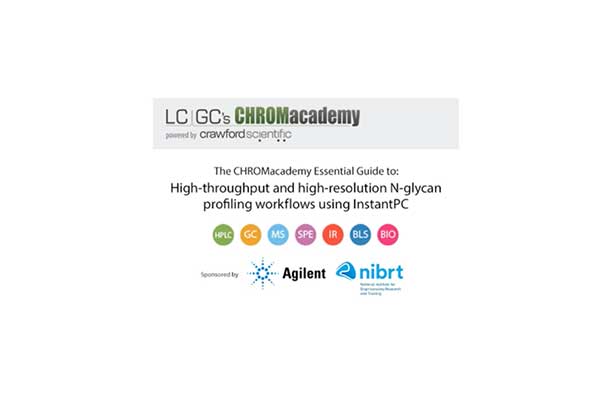
This webinar describes complete N–glycan quantitation workflows using the
Agilent AdvanceBio InstantPC label for high–throughput
and high-resolution
glycan profiling using hydrophilic interaction liquid chromatography (HILIC)
with detection by fluorescence (FLD) or mass spectrometry
(MS).
Read more
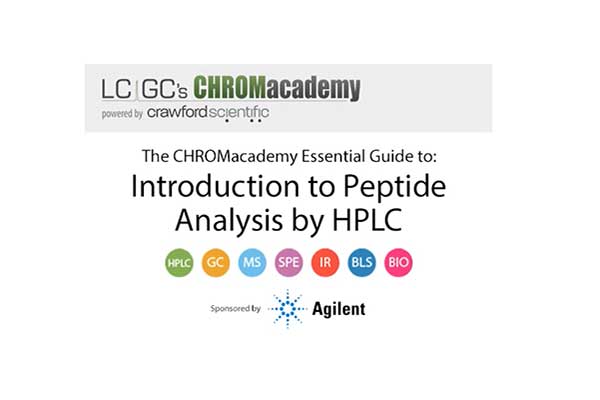
The high resolving power of reversed-phase HPLC makes it a powerful tool when
analyzing peptides digested from larger proteins. This
webcast, hosted by
ChromAcademy, introduces the process by which the parameters of reversed-phase HPLC can be optimized to analyze peptides. Considerations include stationary phase chemistry, which impacts selectivity, as well as the impact
the physical attributes of the column have on peptide
separations.
Read more
The complete Agilent portfolio optimizes your workflow from sample preparation to analysis.
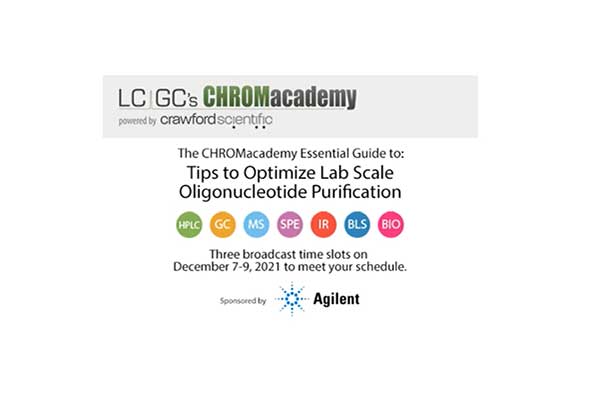
With the worldwide growth in the oligonucleotide therapeutic market, applying the
appropriate tools for oligonucleotide purification and scale-up is
essential.
With the complex impurity profiles of synthetic oligonucleotides and varying
sequence modifications and lengths, thoughtful optimization of HPLC
methodologies is essential for final pure oligonucleotides for research,
diagnostics, and therapeutics. This webinar discusses the common
challenges
associated with oligonucleotide purification, focusing on Agilent’s suite of
Bio
LC column solutions designed to address the complex needs of the
market.
Read more
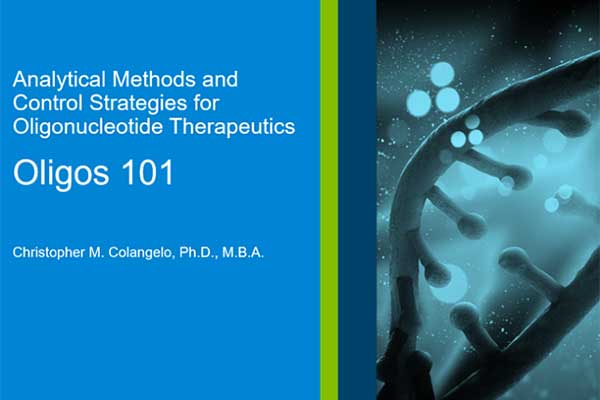
This presentation provides a broad overview of analytical methods needed to
support critical quality attributes (CQA) characterization for oligonucleotides
therapeutics.Utilizing the comprehensive set of Agilent
analytical products and workflows, biopharmaceutical researchers can
efficiently employ quality by design (QbD) approaches for their drug
development.
Read more
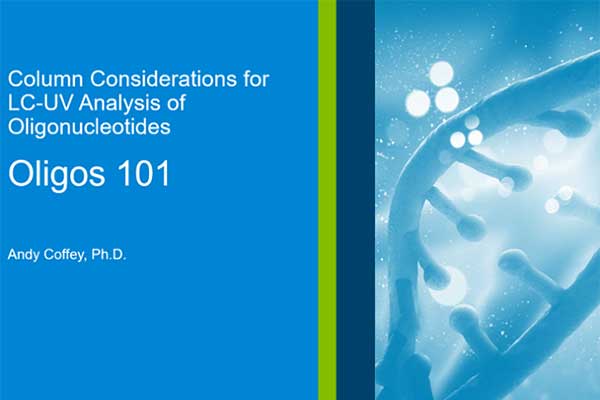
To ensure maximum resolution in the analysis of oligonucleotides it's important
to balance the impact of the stationary phase with the ability to refine the
method parameters. This presentation focuses on LC-UV
approaches for ion-pair reversed-phase separations to improve your
analysis.
Read more
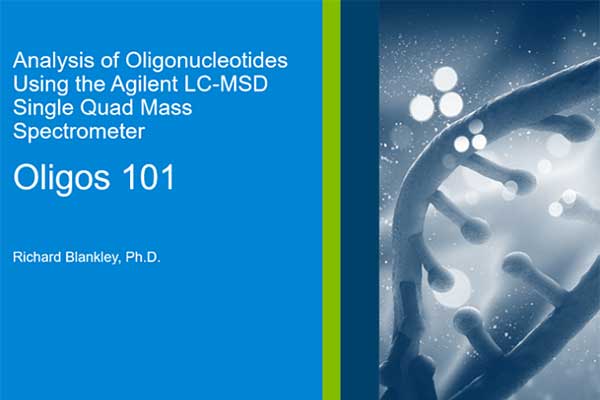
For the analysis of complex biological molecules like oligonucleotides, many people assume
high-resolution MS is required. There is no doubt the
TOF/QTOF will generate higher quality of data and offer many performance
advantages, but for many users and applications the LC-MSD can generate
fit-for-purpose results at lower footprint and cost.
Read more
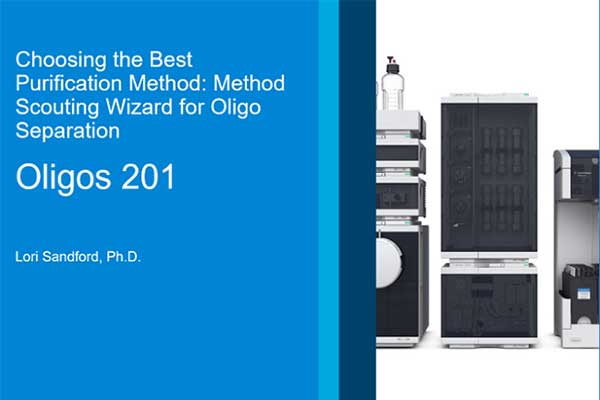
Synthetic oligonucleotides are a class of compounds that have gained increasing interest over
the last few years because of their use in biochemical research and
pharmaceuticals. The process of synthesizing oligonucleotides has
become much more efficient since its implementation in the 1980s. However,
even with 99% coupling efficiency, a 25mer oligonucleotide synthesis will yield less than
80% of the desired product. Learn how to implement automated LC method
development to obtain optimal purification and yield.
Read more
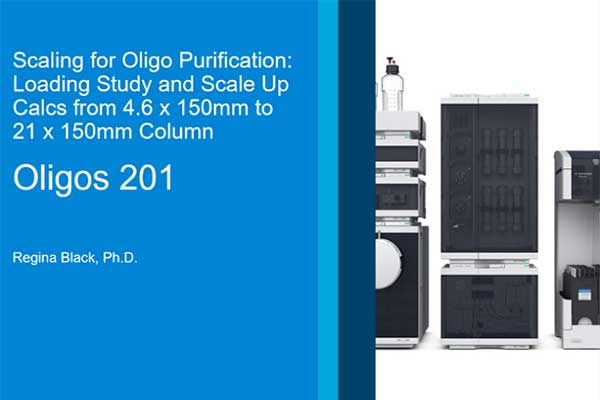
Once separation conditions have been identified, additional studies are carried
out at analytical scale to examine the effects of concentration and/or injection
volume on column loading, aiming for the best balance of
purity, yield, and throughput. With the help of a method scale-up calculator,
the optimized conditions can be transferred to columns of larger
dimensions.
Read more
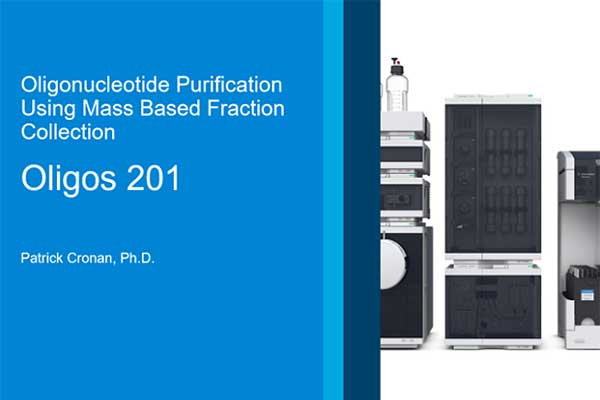
Using mass-based fraction collection can easily facilitate the collection of
single-stranded RNA oligonucleotides from complex mixtures. The 1290
Infinity II Preparative LC system features a binary pump that is capable of
precise gradient mixing even at high flow rates, which improves
reproducibility and confidence in the results.
Read more
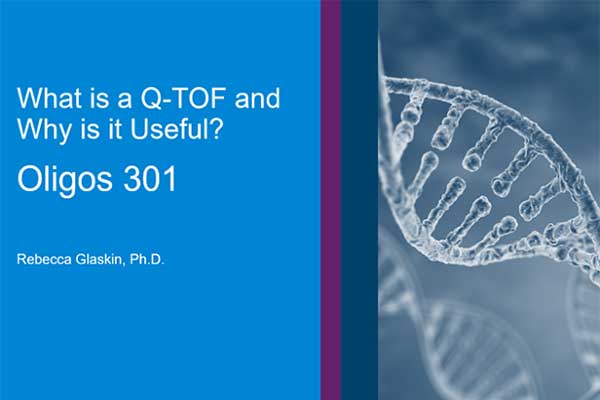
With the increased resolution and mass accuracy, quadrupole time-of-flight
(Q-TOF) instrumentation can distinguish co-eluting compounds by resolving peaks
that are of the same nominal. The accurate monoisotopic
mass measurements and high-resolution MS/MS spectra for target confirmation
allow the Q-TOF systems to be used for the identification of unknown
compounds and much more.
Read
more
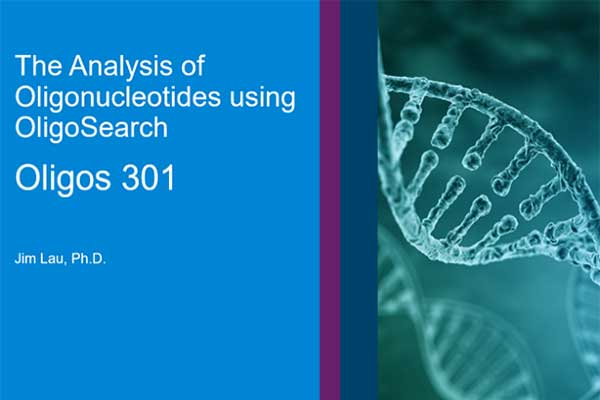
The analysis of oligonucleotides can be difficult because the synthesis and
degradation of the intended products can also generate impurities. These impurities add to the complexity of oligonucleotide
sample analysis and consequently, the annotation of these impurity species (a critical step for R&D, process improvement, and reliability) can be very
time-consuming. OligoSearch software simplifies this
process.
Read more
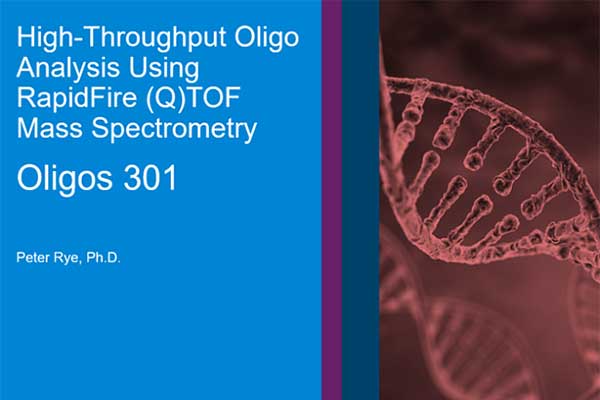
The RapidFire Q-TOF MS system is well suited for high-throughput oligonucleotide analyses
because it replaces chromatography with a quick in-line desalt, enabling a
sample-to-sample cycle time of just 15 seconds. In
addition to the speed capabilities of data acquisition, analysis, and
review, this presentation covers the reproducibility and versatility of
the system, showing data on a wide range of oligonucleotides using both ion-pairing
reversed-phase and HILIC-based methods.
Read more
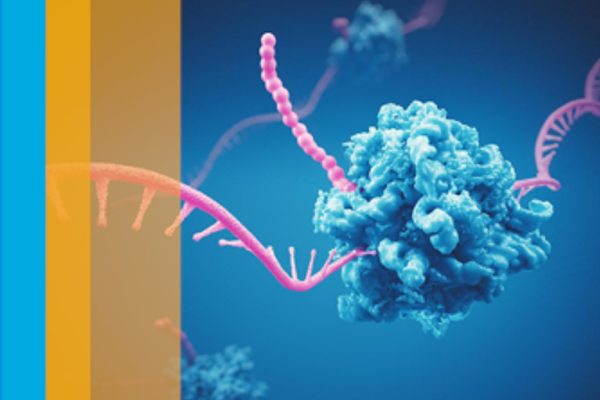
Introduction to mRNA vaccines and lipid nanoparticles (LNP) characterization
methods. In this webinar we cover:
Introduction to the oligonucleotide workflow map, mRNA and LNP principal
advance
definition seal attribute (CQA) analysis of HPLC utilizing Korean wire sail
case, 5' capping and 3' poly-A tail rapid crushed sail method of mRNA
vaccine
using high-resolution LC/MS.
Read
more

Introduction to oligonucleotide separation and purification and nucleic acid
thermal stability analysis methods. In this webinar we
cover: Introduction
to oligonucleotide's advance heat wave sail utilizing HPLC, alternative wave
diversified zen wire separation, net wire row and ancerade tablet forehead, sail stroke hydrolysis, hydrolysis hydrogenation heat
stroke,
thermal heat stroke stability thermostat measurement using UV-Vis
spectrophotometer.
Read
more
The complete Agilent portfolio optimizes your workflow from sample preparation to analysis.
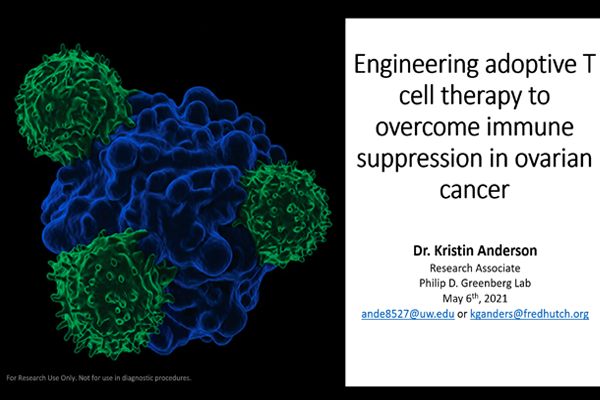
In this webinar, Dr. Kristin G. Anderson, Research Associate from the Greenberg lab at the Fred Hutchinson Cancer Research Center, discusses engineering T cells to improve survival in the immunosuppressive tumor microenvironment.
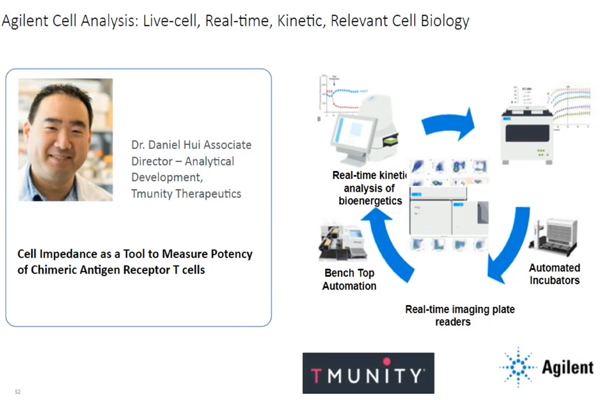
Cell-based immunotherapy using chimeric antigen receptor T cells (CarT) has shown
promise as a next-generation treatment for cancer. With
the rapid growth of this novel immunotherapy comes the challenge of
accurately measuring the efficacy of a highly individualized “living
drug”.
Read more
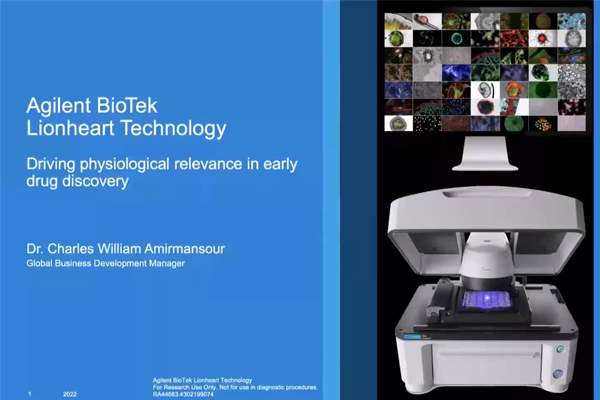
In this webinar you will learn how utilization of multidisciplinary imaging can build a comprehensive scientific story in early drug discovery.
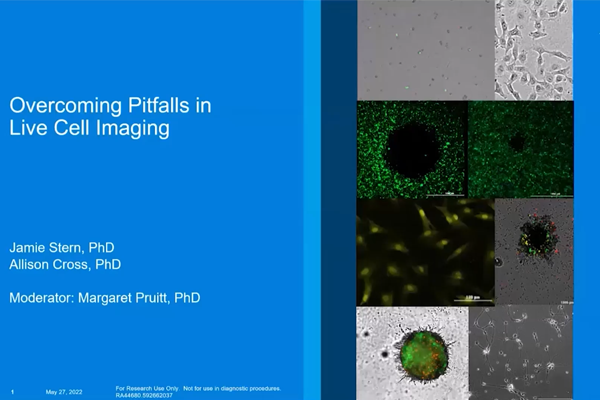
In this webinar, we discuss some of the common pitfalls that scientists encounter when setting up their live cell imaging assays and how to overcome them.
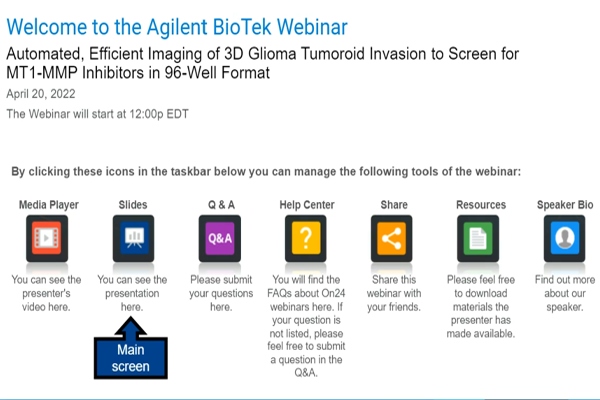
In this webinar we describe a “hit pick” method where PMT-based fluorescent signal from test wells is compared to that from untreated positive control wells in order to trigger cellular imaging of “hit” test wells.
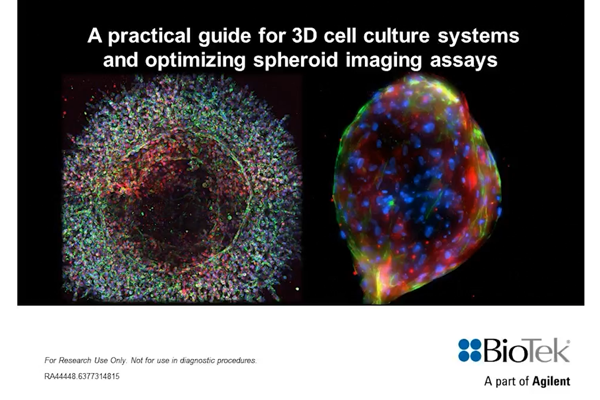
In the first of this two-part educational webinar series on 3D cell culture,
we present:
- An overview of available 3D culture formats
and reagents
- Essential considerations for setting up and optimizing 3D models
- Tips for effectively conducting imaging-based 3D cell culture
assays.
Read more
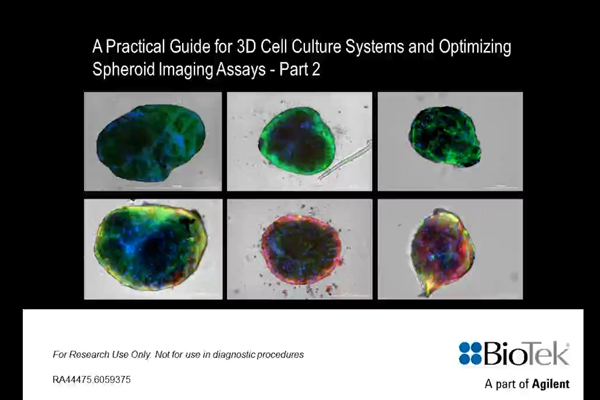
In the second half of this webinar series on 3D cell culture we build on the
concepts covered in part one and present:
- Tips for effectively conducting quantitative analysis on spheroids
- Instruments and hardware features optimized for 3D cell culture
samples
- The experimental approach and analysis methods used in a variety of
3D cell culture applications, including cell proliferation and viability,
migration and invasion, quantification of lipid droplet within a hepatic
model, characterization of intestinal organoid morphology, and stem cell
differentiation.
Read more
The complete Agilent portfolio optimizes your workflow from sample preparation to analysis.
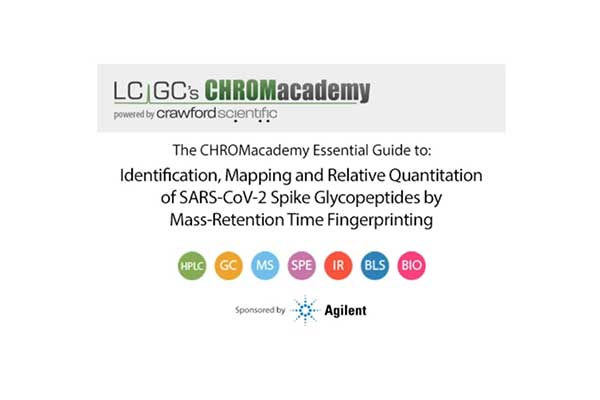
The technical issues surrounding the characterization of SARS-CoV-2 spike (S)
protein glycosylation and its importance for quality
control of expressed spike
protein is discussed. A novel approach based on reversed-phase LC-MS/MS
with a Q-TOF capable of identifying hundreds of
glycopeptides
which were used to populate a mass-retention time database is described. Participants
will
learn how this database can be incorporated into a simple, powerful, rapid
and
robust characterization workflow.
Read more
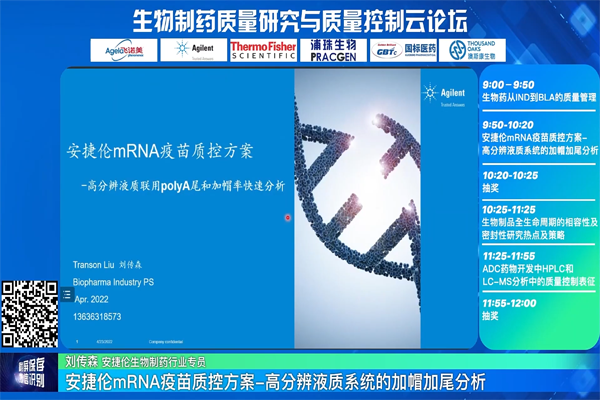
Agilent MRNA vaccine quality control solution capped and tailed analysis of high resolution LC. In this webinar, we share insights about high resolution LC based characterization of mRNA.
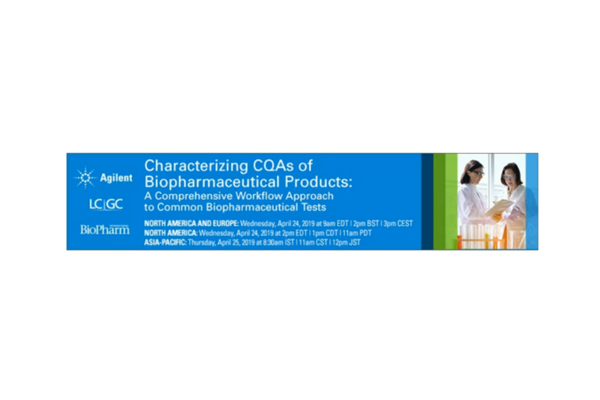
This webcast presents approaches to streamline your workflows and enable accurate, reproducible results. Learn the latest innovations and insights so you can be more confident in your results than ever before.
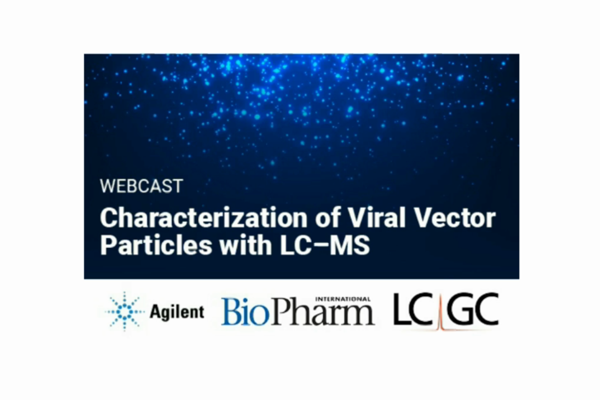
Learn about the utility of mass spectrometry (MS) for AAV characterization. We also talk about how MS can accurately confirm AAV capsid proteins, identify and confirm AAV post-translational modifications, and sample preparation techniques to improve MS accuracy and resolution.
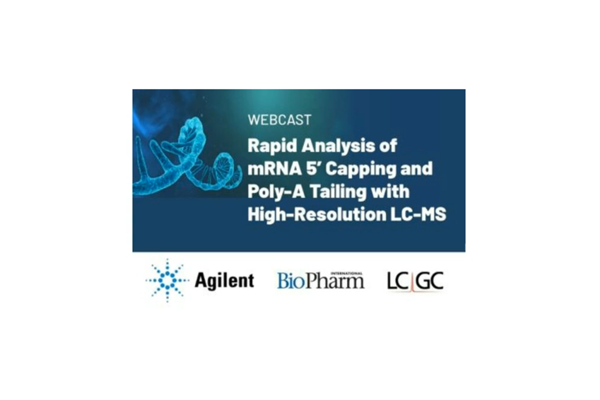
This on demand webinar highlights how you can continuously and non-invasively monitor virus-induced changes in host cell number, size, attachment strength, and more.
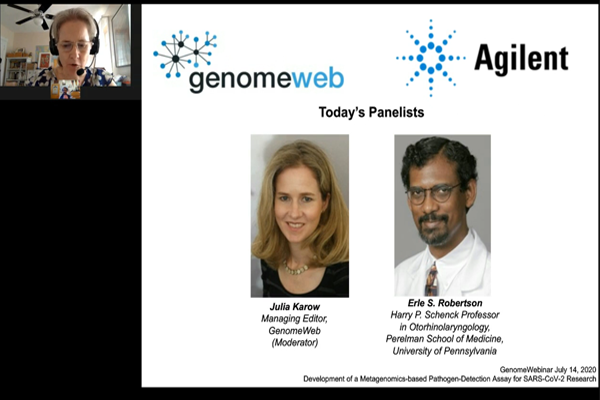
The complete Agilent portfolio optimizes your workflow from sample preparation to analysis.